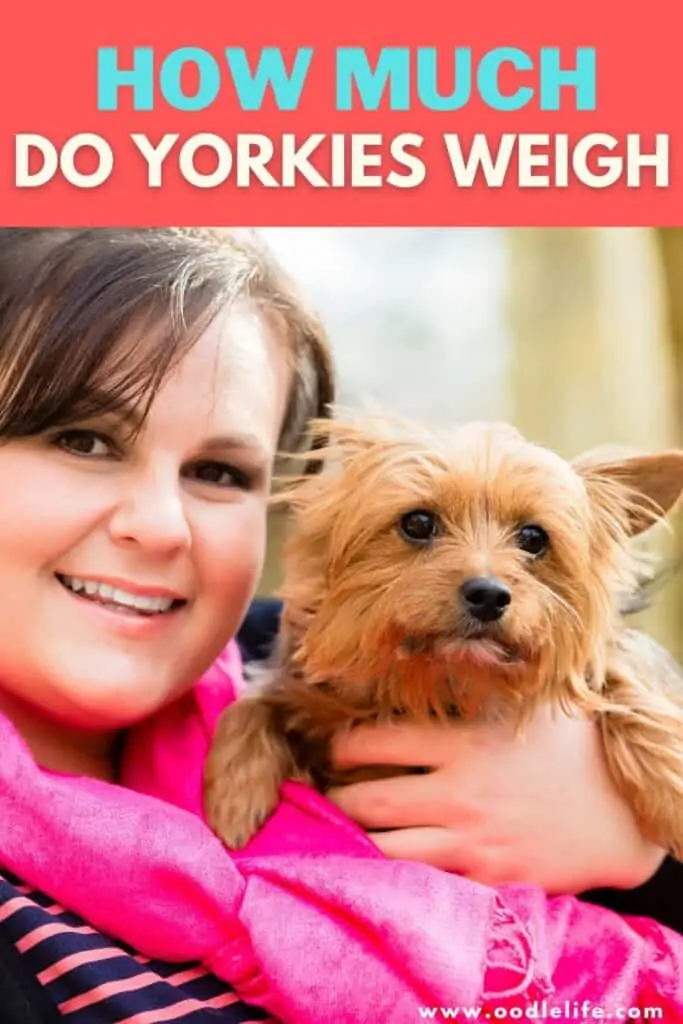How Much Does a Yorkie Weigh?
Yorkies are one of the smallest dog breeds out there, so ensuring they are at a proper weight is essential. We all want our lovely pets to live as long as they can, and one of the best ways to do that is through diet and avoiding excess food consumption.

It might feel like you’re withholding some of the best that life can offer by not giving them everything they want, but in the long run, a healthy Yorkie at the correct weight will be much happier than an overweight one.
It can be hard to say no to a Yorkie when it comes to treats and feeding. “Don’t look at me with those big, pleading eyes. The sushi with raw tuna I am eating is not good for you!”
Average Weight of a Yorkshire Terrier

If you have ever gone to the store and picked up a butternut squash, that is the average weight of a Yorkie—about five pounds. However, not all Yorkshire terriers are the same, so the ideal weight for your Yorkie might be different than your neighbor’s.
How much does a Yorkie weigh? Typically an adult Yorkie weighs between four and seven pounds. There have been instances where a Yorkie can weigh up to ten pounds. Anything bigger, and it’s generally due to a larger different dog breed being introduced somewhere (like a Yorkie-poo).
The best way to determine if your Yorkie is the correct weight is to inspect your dog and ensure they have the proper proportions.
Inspecting Your Yorkie’s Body Mass
A physical assessment of your dog can put a lot of worries to bed, especially if you don’t trust the scale to be accurate. I know of a Pomeranian who is perfectly healthy at eleven pounds, even though typically she should be around nine.
Here are some ways to inspect that your Yorkie is a good weight:
- Take a look at them from behind. If your Yorkie is a good weight, there should be a gentle inward curve between your dog’s ribcage and waist.
- Get a look from the side. There should be a gentle curve up from the ribs to the abdomen.
- You can also check when you’re petting your dog. You should be able to feel every rib but shouldn’t be able to see them visually.
- You can also run your fingers down their back to feel for the vertebrae. This should also be felt but not seen.
If your Yorkie is overweight or underweight, they are at higher risk of health problems, including getting injured more easily and hip dysplasia. If you think your dog’s weight isn’t where it should be, talk to your vet for confirmation and see what you can do to help the problem.
Signs of Underweight Yorkies

Underweight Yorkies are just as serious as overweight ones. Since they are so small, any serious fluctuations in their weight can cause severe health risks. It’s up to us, their owners, to watch their weight and make sure they are healthy and happy.
- A sharp curve between their ribcage and waist when looking behind
- From the side view, it looks as if their abdomen is tucked under the ribs.
- You can visibly see their ribs.
- Any prominent or jutting bones is a sign of being underweight.
Helping a Yorkie Come Up to a Healthy Weight
If your Yorkie is underweight, that can lead to brittle bones, making them easier to break as well as lung and circulatory problems. They’re also more prone to heart problems, especially if they get lots of exercise.
- Slowly increase their food intake and make sure they get treats throughout the day.
- Use a harness when out and about, keep them away from larger dogs, and don’t carry them with one hand to prevent dropping and breaking already fragile bones.
Signs Your Yorkshire Terrier Is Overweight
Yorkshire terriers can become overweight if they aren’t fed the correct food or exercised enough.

Just like humans, once they start putting on the weight, it’s hard to take it off. For Yorkie’s, that’s exacerbated by how small they are. Any excess weight is a big deal when you only weigh five pounds.
Signs your Yorkie is overweight:
- Trouble walking or being able to do strenuous activity.
- Can’t feel the vertebrae or ribs at all.
- An outwards slope from the back view.
- No upward curve from the side view.
How to Help Your Yorkie Lose Weight
An overweight Yorkie has serious health risks. Canine diabetes, shorter lifespan, kidney issues, early arthritis, high blood pressure, skin, and respiratory diseases, and certain cancers are more likely when your dog is overweight.
If you do notice your dog putting on weight, take action immediately. Always consult with your vet about dietary restrictions and ask the family to quit feeding the dog table scraps.
- Talk to your vet about a lower-calorie food that’s still high in nutrients. Slowly change your dog’s food by adding half of the old and half of the new and gradually increasing the new.
- Add exercise in slowly, primarily if your dog is used to laying around the house all day. Take them for a walk up and down the block, then around the block, and so on. You don’t want to give your Yorkie any negative feelings about going outside.
Can Your Yorkie Be Larger and Still Be Healthy?

Absolutely. If your Yorkie is over nine pounds but doesn’t look overweight and your vet isn’t worried, then you can rest easy knowing your dog is perfectly healthy.
The structural composition of your dog will also affect how much they weigh. Dogs with longer bones will weigh more since there’s more to cover. Their muscle mass will play a role as well.
If you still aren’t sure, talk with your vet and see if it’s something they’re concerned about.
Genetics Affecting Your Yorkie’s Weight
Genetics plays a large part in how big your Yorkie is and how much weight is ideal for them. Larger Yorkies will create larger pups. For those wanting those super tiny and cute “teacup” Yorkies, know that the breeders that breed these dogs are irresponsible, and these Yorkies have a whole host of health-related problems, including:
- Weakened immune systems
- Dental issues (like periodontal disease)
- Stunted livers
- Brittle bones
- Hypoglycemia
- Prone to injury
These are some of the issues you will have to deal with from teacup Yorkies, and it will affect their entire lives. It’s so sad when breeders choose aesthetics over the health of their dogs.

Wrapping Up
We all want our pets to be around for as long as possible. One of the most critical things you can do as a dog owner is making sure your pup is healthy and that health starts with their weight.
While ensuring the ideal weight of all dog breeds is imperative, it’s even more critical for smaller dog breeds as a shift, either way, can hurt them. I hope your dog remains with you for a long time, living the best life it can while being active and healthy.